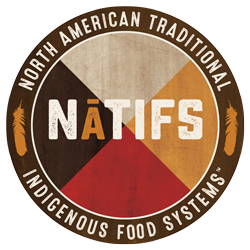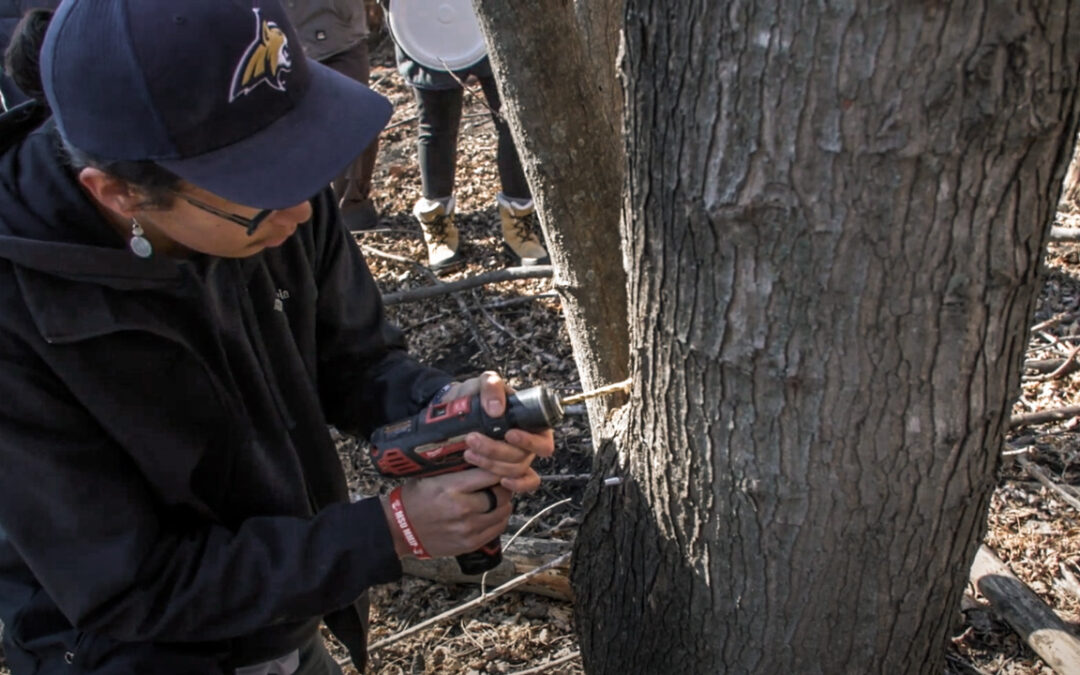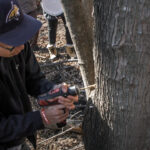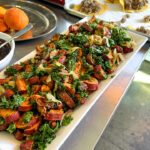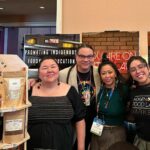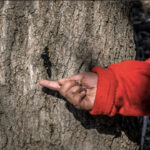Since its founding, NATIFS has received internship requests from all over the world.
Some people simply want to “stage” at Owamni (a restaurant term for when an aspiring chef spends a period of time learning from a professional kitchen) but others want a broader Indigenous Food Sovereignty experience that requires everything from making cooking videos to teaching workshops.
NATIFS is thrilled to begin a pilot program of our internship opportunities with our current intern, Seth Still Smoking (Blackfeet, Lakota), a Montana State University student currently enrolled in Buffalo Nations Food System Initiative, that school’s education and research program that supports Intertribal Food Sovereignty.



Above, from left to right: Food prepared by Seth and MSU classmates using Indigenous ingredients. Seth and MSU classmates harvesting gallons of juneberries. Seth helping fix a fence.
In that program, Still Smoking (who has since left his original major of Sociology) said that he was learning so much about growing food, but not enough about what to do once he had the food in hand. So his professor reached out to NATIFS, and an internship was created for his needs.
The NATIFS culinary team says that he’s been an ideal addition to their programming and that the partnership is super symbiotic, forcing the kitchen to challenge itself as well.
Ana Garcia Castellanos, Education Coordinator at NATIFS, illustrates this exchange:
“When Seth comes in and says ‘I want to focus on foods that are growing in Montana, we may not have those foods here, so it turns out that we are all sharing and trading knowledge. This is really beneficial for us as an organization– to get to know a lot more about other nations and to bring those ingredients into our kitchen. And this is probably just the first of many.”
Linda Black Elk, Educational Programming and Community Outreach Leader, and expert on ethnobotany, food sovereignty, medicine making, gardening, and foraging agrees that the cultural exchange is invaluable with relationships such as this one and that they go far beyond a standard internship the way they are commonly thought of.
“Seth is super interested in medicinal plants, and also has super good instincts on how his people’s Blackfeet medicinal plants can fit into recipes, too. There’s an old book of recipes that Seth has been looking into, seeing how they’ve been translated, which is a really beautiful adventure – I think it’s going to be really beneficial to him and his people,” she explains, and of course, NATIFS has much to gain from what he learns as well. This opportunity for becoming kind of a clearinghouse for Indigenous knowledge has always been at the heart of the Indigenous Food Lab’s reason for being, and it’s beautiful to see it coming into practice, the team says.
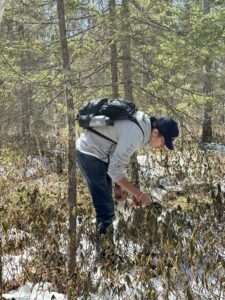
Above: Harvesting swamp tea or labrador tea (Ledum groenlandicum) on a staff foraging trip.
And for Seth, he’s learning much more than simply how to apply culinary techniques to the food he’s grown. Though he’s changed his major, he’s still exploring interconnectedness between sociology and food, and he’s worked on knowledge applications like food waste management, AV equipment, wildlife proteins, working with the Nixtamal team making tortillas, helping with the Red Cloud School lunch program initiative, and food kit assembly, including Project BRAID, which connects participating Native youth and families to traditional Indigenous foods and cultural lifeways, including NATIFS and the Indigenous Food Lab, where the team is creating culturally appropriate and affordable meal kits (think Hello Fresh, using all Indigenous ingredients). Families are also invited to a food demonstration at the student’s high school, where they can learn about how to work with the kits at home.
Finding out about food sovereignty initiatives has changed the course of Seth’s future, inspiring him to bring back all that he’s learning to his entire community– which is one of the major impacts of the work that NATIFS and IFL do. Benefits that extend far beyond the individual.
“I’m thinking of working with communities and schools using food to help us come back to live more sustainable lives. Art, language, and culture are factors too, but at this point in my life, I think that food is a really big part of how we can come back to our communities.”
